On Oct 6. Salma Shurrab said goodbye to her hometown without knowing it.
Breaking her usual midnight curfew, she indulged in a late-night car ride. With her cousin, Rana Alghussain, in the passenger seat, Shurrab, 22, drove through Gaza City singing along to blaring pop music.
“We literally said goodbye to every street,” she wrote in her journal, listing off street names and neighborhoods the duo drove through. “I’m so thankful that coincidence happened because it made me say goodbye to Gaza.”
After surviving 60 days of Israel’s military offensive that has flattened swaths of the Gaza Strip and killed more than 31,000 people, according to local health officials, including several of her friends, Shurrab fled to neighboring Egypt.
The key to her own survival has been what the dentistry student calls her “trauma journal,” in which she spent hours writing about “the good, the bad and the ugly” during sleepless nights.
“It holds who I am. That’s how I’m gonna stay connected to the past life I had in Gaza, even though it was destroyed,” she told NBC News — which has followed her experiences since the beginning of the war in Gaza and now her life in Cairo.
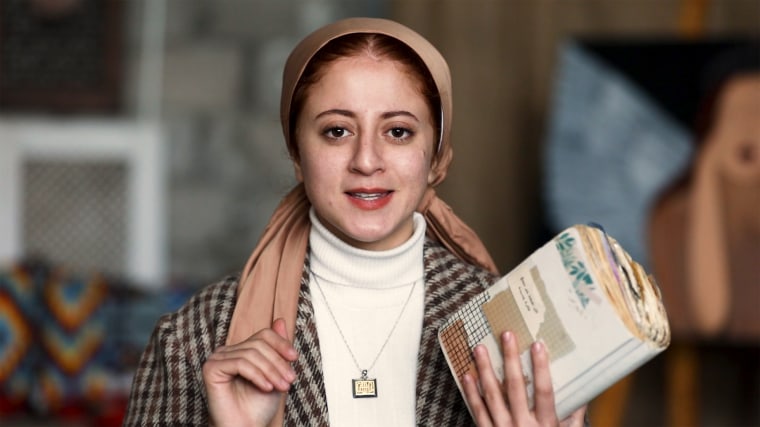
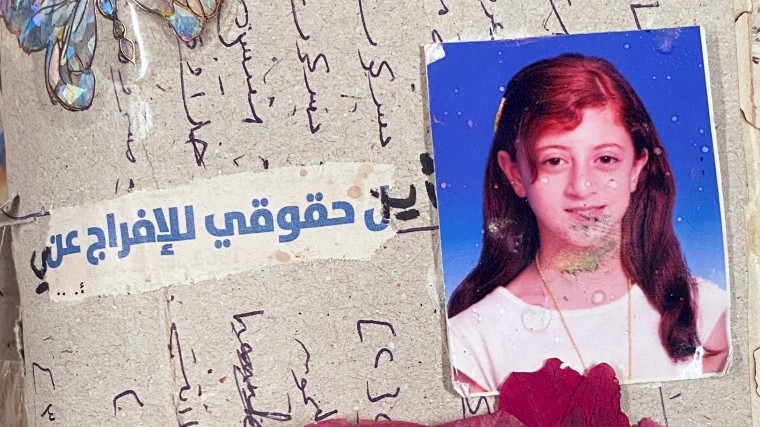
Shurrab’s diary bursts with collages of family photos, dried flowers and keepsakes collected in the rubble, including a stray bullet. One page chronicles her forced evacuation from her childhood home. Another features the cutting words: “Looking forward to staying alive.”
Harnessing the mix of grief and gratitude reflected in her diary, Shurrab now holds informal workshops to teach other Palestinians who fled the war how to access and confront their pain through journaling.
“I witnessed so many traumas. The journal was my therapy in the time I needed it the most,” she said. “Mental health awareness is the thing that Gaza needs right now. Everyone’s traumatized, and everyone’s needing help.”
‘There is no P in our PTSD’
Shurrab had begun recording her thoughts, feelings and experiences in a diary a year before the war, which began Oct. 7 when Hamas launched a multipronged attack on Israel that authorities say killed 1,200 people and saw 240 taken hostage.
But it was lying next to a blue United Nations High Commission for Refugees logo on her family’s makeshift tent in the southern border town of Rafah that prompted her to continue recording her tumultuous life.
“When I was under the tent and saw the logo, all the emotions came to me that I am one of these refugees now and people who lost their homes and I have to accept it,” she said.
For Shurrab, the U.N. symbol triggered thoughts of the “Nakba,” or “catastrophe” in Arabic, which many use to describe the 1948 displacement of roughly 700,000 Palestinians who fled or were expelled from their land in what became Israel.
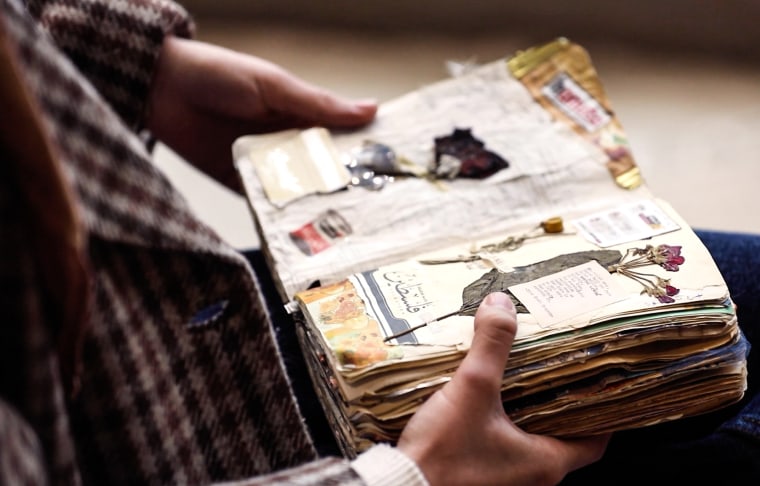
Today, more than 90% of the enclave’s population has been driven from their homes.
In Cairo, Shurrab no longer lives in a danger zone, but she still finds it hard to distance herself from thoughts of the UNHCR tent because her parents, whom she’s desperately trying to get out, are still in Gaza.
“My family is still under the tent. I still can’t escape it,” she said. “And there’s part of me that feels the guilt that I have access to water, electricity, lights, bathrooms.”
‘The trauma is persisting’
While war’s toll on mental health has become more researched since PTSD — posttraumatic stress disorder — was coined in the 1980s after veterans’ experiences in the Vietnam War, experts say that exposure to protracted and ongoing conflict poses distinct mental health challenges.
Scarred by ongoing violence, military occupation, land seizures and restrictions on their movement, Palestinian youths and young adults — both in the Gaza Strip and the occupied West Bank — are especially vulnerable to significant mental trauma.
“It’s one of the places in the world with the highest rates of psychological distress,” Dr. Audrey McMahon, a psychiatrist for Doctors without Borders, said in a telephone interview from east Jerusalem.
Last year, an in-depth World Bank study found that 71% of the adult population in Gaza exhibited symptoms consistent with depression. In 2022, more than half of Gazan children expressed suicidal ideation, according to a Save the Children study. A further 80% of participants reported emotional distress.
“When you have a population of children that score so high for psychological distress and for depression, the question is not what’s wrong with these children? But what’s wrong with the context? Because this isn’t normal,” McMahon said, referring to the data and her mental health work visits in Gaza.
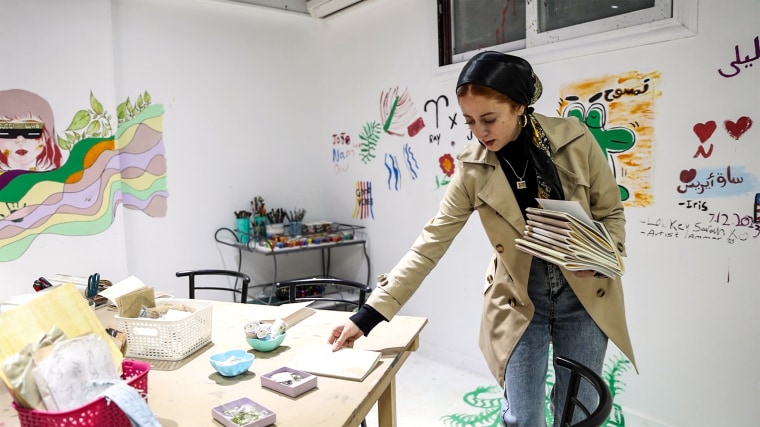
Yara Asi, author of “How War Kills: The Overlooked Threats to Our Health,” said that many events in Gaza undoubtedly qualify as being “highly traumatic,” including witnessing mangled bodies and being displaced from one’s home. But when such experiences are coupled with a “lack of any conception of when this will end,” and no avenues for justice, it exacerbates the trauma, she added.
“We need to stop looking at trauma just as the event itself,” she said. “The trauma is persisting. If there’s no accountability, that in itself is continued trauma, even if the child lives and is resettled in Egypt.”
A 2020 study of preteen and teenage students in Gaza found that more than half of the participants fit the diagnosis criteria for PTSD.
But Dr. Samah Jabr, a longtime clinical psychiatrist who chairs mental health services at the Palestinian Health Ministry in Ramallah, said Western mental health diagnoses fail to encompass the impact of ongoing “oppression.”
“PTSD can better describe the experience of a soldier,” she said. “That’s not the situation of Palestinians; they are fought continuously in their homeland. So the Palestinian experience is colonial, historic, collective, cumulative and cross-generational. There is no ‘P’ — there is no ‘post’ in our PTSD,” she added.
‘Traumas are not something to avoid’
Surviving seven wars in the last two decades, Shurrab knows these challenges well. It’s why she’s passionate about mental health and art therapy as a means to heal. Since arriving in Cairo, she’s hosted 10 journaling sessions attended by Palestinians who have fled the war, as well as Egyptians, and hopes to pursue studies in creative-driven therapy methods.
In recent years, journaling and expressive writing have become more researched tools to alleviate mental health conditions, such as PTSD, and build resilience amid persistent pain and loss.
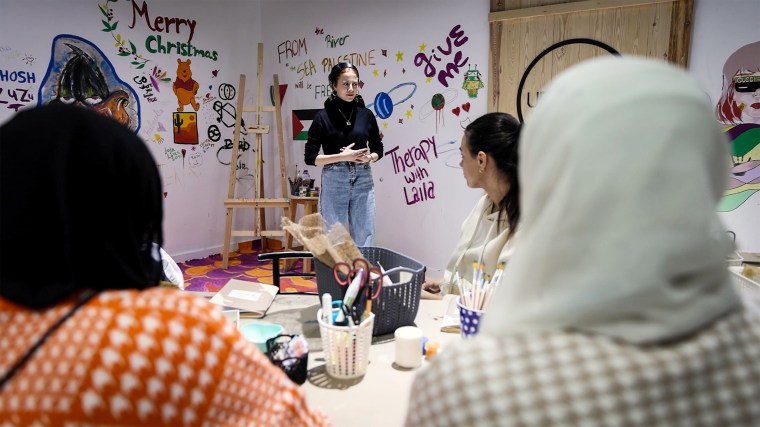
Before she fled Gaza, Shurrab vowed to only fill her diary’s last page if she survived the war.
The page eventually featured anguished goodbyes and open-ended questions such as “What will happen to my parents?” and “Where am I going?”
“Questions I don’t have answers to until now,” she said, reflecting on the last page of her Gaza journal.
But despite the layers of uncertainty coursing through her journal, Shurrab and her diary are resolutely hopeful.
“Traumas are not something to avoid,” she said, adding, “They are the stuff that build, make us fuller and make us more experienced and full of life.”

